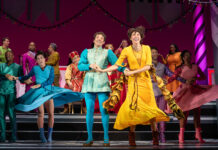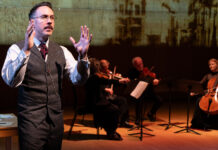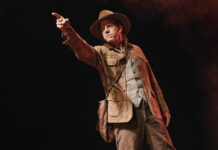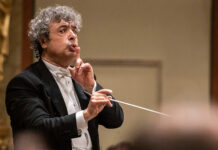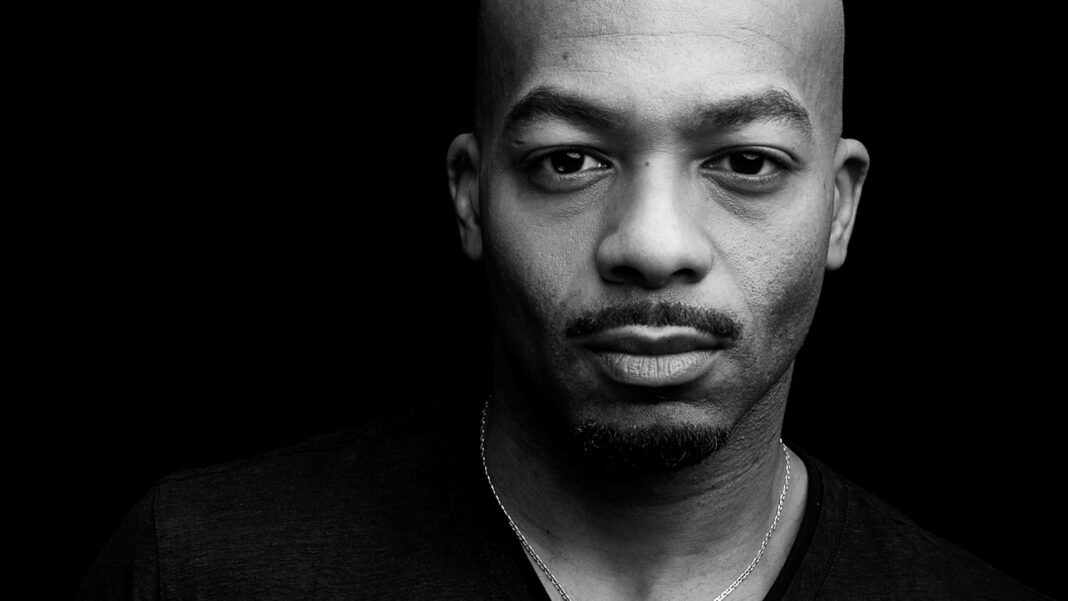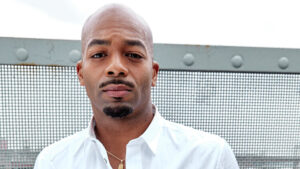
Perhaps the most common image of a performer singing, dancing or playing an instrument in a train station is one that conjures up ideas of people in subway stations in New York or perhaps London. Busking, as it is sometimes referred, is a centuries-old tradition. So when you find Broadway star Brandon Victor Dixon at Union Station in Los Angeles this weekend, don’t mistake him for a busker.
MUSE/IQUE, headed by Rachael Worby, has been celebrating Sunset Boulevard and the many people, artists and locations that have called that street home across its nearly 22 mile length. The final concerts of this series will take place on Saturday, November 12th and Sunday, November 13th at the beautiful train station built in 1939.
Dixon may be best known to audiences for his Emmy Award-nominated performance as Judas in the 2018 live performance of Jesus Christ Superstar on NBC. On Broadway he’s appeared in The Color Purple (the original production), The Scottsboro Boys, Hamilton, Shuffle Along: Or the Making of the Musical Sensation of 1921 and All that Followed and he just wrapped a run as Billy Flynn in the revival of Chicago.
In addition to his career as an actor, he’s also a producer of Broadway shows (Hedwig and the Angry Inch, Moulin Rouge! The Musical) and the Maryland branch of the Jimmy Awards (which celebrate the best in high school musical theater) has named their awards after him. Dixon is from Gaithersburg, MD.
Earlier this month I spoke with Dixon about the state of Broadway today, his Broadway career and most importantly what he’d like his life to feel like moving forward. What follows are excerpts from our conversation that have been edited for length and clarity.
How did you feel when the Maryland off-shoot of the Jimmy Awards wanted your name for this branch’s awards?
I was apprehensive at first. I really wanted to think about what that meant and what it meant to put your name on something like that and joining an organization that creates a portal for children. I think it’s a responsibility and I had to think for a moment about all that had brought me here and really measure if I felt that I had earned that.
How did you come to the realization or the acceptance that you had earned it?
I accepted the fact that there are young people out there who do what I used to do. They sit in their room and listen to cast recordings of me. That is what I used to do and I recognize the power of that. I recognize that matters. Every instance in which I’ve been able to participate in something like that it means something.
As somebody who was listening to cast albums, when did you start envisioning what you thought your career might be? How much of that vision has been realized so far?
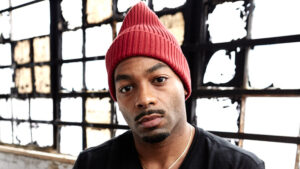
I’ve held a vision of the kind of career I’ve molded from a very young age, which I think has helped enable me to to craft it. In many ways it does. In many ways it does not.
I tell young people now when I speak to them, I wish I had spent more time thinking about how I wanted my life to feel as opposed to how I wanted my life to look. We often talk about what you want your life to look like in five years and ten years. Now what do I want my life to feel like is the more important thing.
But I do think many of the things that I envisioned have fortunately come true. There’s still some boxes I want to check off.
When I was young I didn’t think about being in television or being in films. I really only thought about being on Broadway. I wanted to be the 19-year-old sensation on Broadway. I didn’t quite make it there, but that’s what I always wanted. Once I got The Color Purple, The Lion King [on tour], then it’s really interesting. What does life look like once you’ve achieved, quote unquote, your dream?
When you’re approached about something like MUSE/IQUE’s series, what are you looking for in those opportunities? How did this concert fit in to what what you thought would be the right thing for you to do?
I connected with Rachael and she described to me her background, her love for music and her vision of the value of its place between people and wanting to create unique live musical experiences for communities. That is something that aligns with my own personal philosophy.
Then when she described the scope of this year’s curation I really thought it was a pretty fantastic way to illuminate these elements of music and culture that people don’t necessarily know too much about. So I was grateful to do the the inaugural concert Sunrise on Sunset and very grateful that they’ve asked me to come back for this one.
This series is exploring Los Angeles and what the music that comes from here mean to this city. What does the music of Los Angeles mean to you personally or professionally?
I’m an East Coast boy. I enjoy the time that I spend on the West Coast and that I spend in Los Angeles. But this project and becoming a part of this organization is helping me really learn a lot about Los Angeles and its music culture. It’s really through this experience that I am starting to learn a lot of things and where these intersections lie.
As we’re speaking you are in your last week as Billy Flynn in Chicago on Broadway with openly transgender actress Angelica Ross (Pose). What do you think her casting in this production says about whether or not Broadway is truly making serious strides in opening up how shows are cast?
I don’t know what it says about Broadway as a whole. One of the interesting things is when we talk about Broadway, we talk about Broadway as if it’s a company called Broadway Incorporated with a board of directors and a CEO and human resources department. And it’s not. It’s a geographical location that consolidates a series of resources that entrepreneurs come in to create art. Really there is a spectrum of producers and the vision they have and how ready they are to create space, to move things forward in terms of the projects they want to produce; the creative teams they’re willing to put together to produce them and the cast that they’re willing to put together to put them out there.
A lot of the artists with whom I’ve spoken in the last couple of years have said what Broadway needs is braver and bolder producers. It’s not that there’s a lack of talent, either creative talent on stage or off, but there’s a lack of of true courage on the producing side of things. Do you agree with that?
Broadway has, until this kind of interruption, a cultivated audience. It cultivated a set of tools that are designed to cater to that audience and to create products that that audience wants to consume. You see it even in the increasing commercialization of projects. There’s a lack of diversity, not just in kind of the demographics represented in creatives or in design or other projects. But there’s an increasing lack of depth and risk in even the mainstream productions. They’re mostly brand-driven. They’re looking for built-in audiences, looking to ensure a product. They’re increasingly at odds in an environment like this, which makes it harder for people to make those kinds of choices.
I felt like this season that just ended in June was potentially very risky since producers were putting a lot of bets on shows that had been created by people of color. My fear is that if they didn’t do well, the money people would just say, well, we tried. That they would not allow any opportunity to fail. How important do you think it is for artists such as yourself or playwrights or designers to actually fail in order to achieve the greatness that they believe and probably do have in them?
I think that kind of fear you have is a very real one. Particularly when you do decide to produce these projects in a very severely challenged commercial environment already. A lot of these works would need ideal circumstances under the the old model before all of this happened. But when you’re trying to produce them under this duress, those fears are even more.
As for The Scottsboro Boys, which I loved and think is one of the most powerful musicals ever written, it strikes me that this show would probably resonate far more strongly today and be more widely seen and accepted now than it might have been 12 years ago when it was originally produced. What are your thoughts on the staying power of that musical and whether it was ahead of its time?
I think The Scottsboro Boys is definitely ahead of its time. I think it’s a masterpiece and I don’t know if this environment is one in which it would be better received. I think the topics in that show are very sensitive to an American audience. So I don’t know.
Was the London experience better?
I won’t say whether it’s better or worse, but I think the London experience was a very good one. I think the London experience was a great one. The show won the Evening Standard Award. It was very well received. It was pretty much a sold-out run. The thing there is that the British audience is able to distance themselves from personalizing some of the more challenging elements of the project and able to just appreciate the storytelling and the incredible theatricality of the work.
When you were asked to interrupt the curtain call speech at Hamilton to address Vice President Mike Pence, who was in the audience, what did getting that kind of request meant to you? Why do you think of all the cast members who were currently in the show at the time you were the one chosen to say what Lin-Manuel Miranda had written?
At that time we were giving the Broadway Cares speech after this show. That’s the time at the curtain call when we traditionally speak to the audience – at least during that season. I was the individual who had been giving those speeches at that time, for the most part anyway. So I don’t know that there was any special reason outside of the fact that this is already kind of the circumstance we were in.
Were you surprised at the conservative backlash?
I was because I thought the statement was certainly non-partisan and fairly innocuous. So on one hand I was. Then on the other hand, considering the nature of our political discourse, even just at that time, I shouldn’t have been surprised.
Five years ago, you did an interview that was published in Case where you said, admittedly by the writer with “a mischievous grin” that “This republic’s probably only going to last another 20 or 30 years.” Five years later, whether as a joke or not, are you hopeful that that this republic is going to last?
In its current form I don’t think it can. It has to change. I don’t know how that will manifest itself. Things are coming to a breaking point in certain areas. If we don’t release the pressure valves I think things will either change with difficulty or they can change hopefully with more ease. But I do think that the republic, as we know it, will have to change.
As you said earlier in this conversation, the advice you give to people is not to think just about what it is they want to do, but how they want their lives to feel. So if you could look forward now to what the next 20 years of your life, what do you want your life to feel like?
That is a question I do not have an answer for today. I will be honest with you. I want it to feel well-lived and well-given. I want to know that I honored the people in my life who have helped give me all the opportunities that I’ve had and that I have. But beyond that, I do not know. But I hope to soon so that I can forge the path.
Main Photo: Brandon Victor Dixon (Courtesy MUSE/IQUE)


